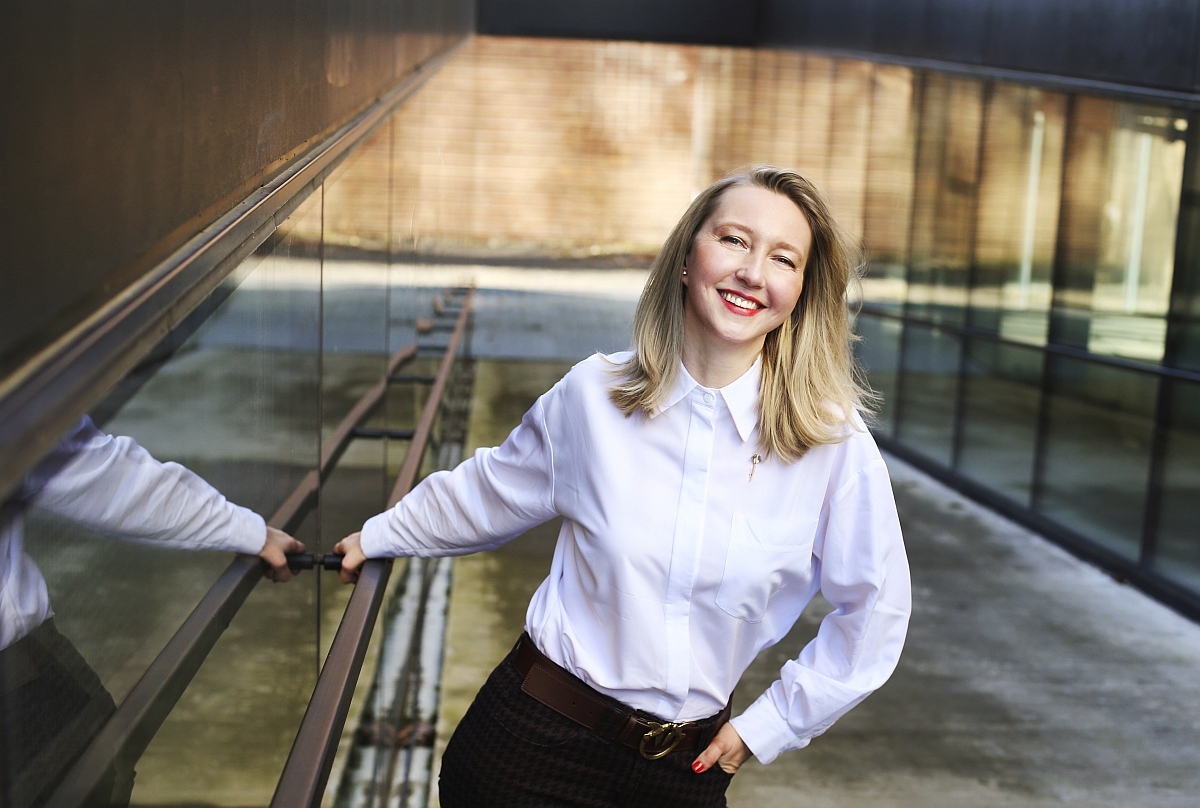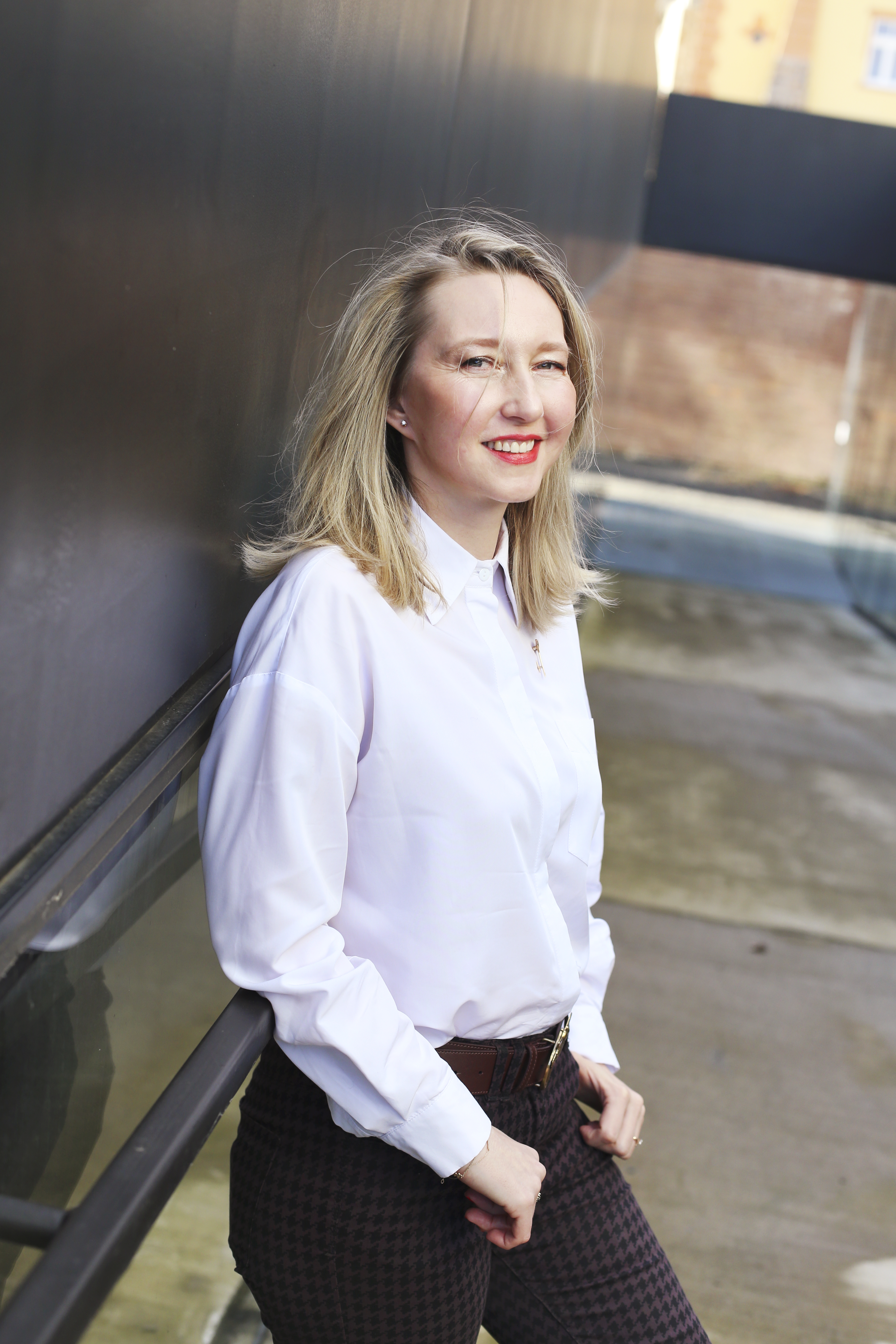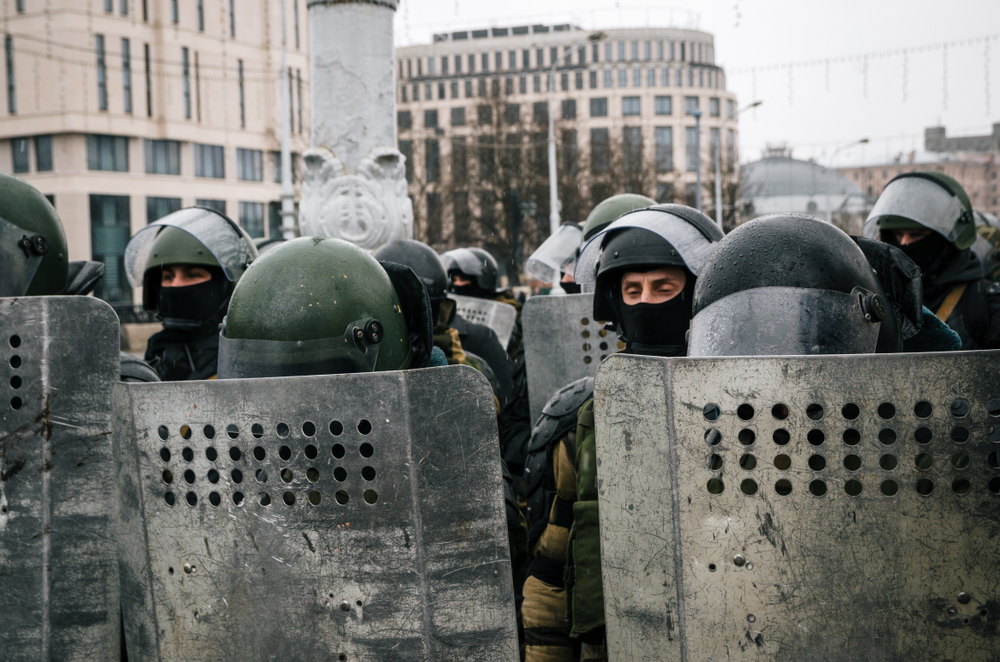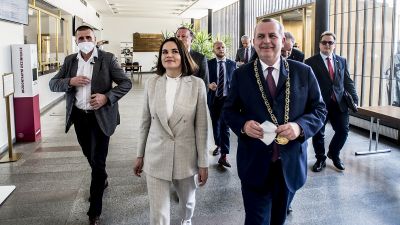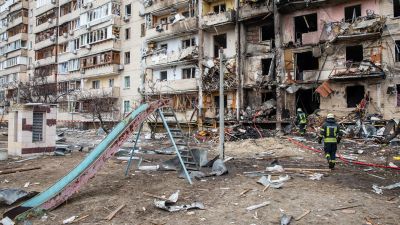“It has to be talked about, even though personally it hurts a lot...” This is how Alena Marková from the Faculty of Humanities of Charles University reacted to a question about the situation in Belarus. The Belarusian-born historian, who focuses on the contemporary history of her homeland and the question of national identity, warned that the country's ‘normalisation’ has become “eerily similar” to the so-called normalisation in Czechoslovakia after the invasion of August 1968. Our interview took place shortly before Russian forces invaded Ukraine.
Why Alexander Lukashenko won the 1994 presidential election with his populist programme is clear. However, I was surprised by the results of the referendum held in the country a year later. At that time, over three-quarters of the voters voted in favour of a new flag and state emblem harking back to the days of the Soviet Union, the introduction of Russian as a second state language alongside Belarusian and back the country’s economic integration with Russia. In the referendum, voters also supported a change to the Constitution that allows the president to dissolve Parliament if need be... What led Belarusians to make such a U-turn back to Russia?
The first half of the 1990s in Belarus was turbulent, linked to the economic and social uncertainty that emerged after the collapse of the Soviet Union. Inflation destroyed most peoples’ savings; sometimes people literally had nothing to eat. Suddenly, however, a charismatic leader emerged who promised to put everything in order and 'crack down on the corruptors'. Most people at the time trusted Alexander Lukashenko, and thought integration with Russia and a return to certainty was a good idea. But the referendum did not go according to the rules. According to the legislation, the national language and the form of the national symbol were not allowed to be decided by popular vote, yet it was held. Moreover, there were numerous violations during the referendum. Notwithstanding, the referendum results came into force.
What was life like for Belarusians during the Soviet era?
Because of the development of industry and the economy, the Belarusian Soviet Socialist Republic had one of the highest living standards of all the republics of the USSR. The difference with other countries was that the Russification, which had already been ordered by Stalin in the 1930s, was “most successful” in Belarus. The Belarusian national identity and language were disappearing... That is why the Belarusian dissent was not anti-communist and anti-totalitarian as in Czechoslovakia, for example, but mostly pro-national.
So the successful Russification and the relatively good economic situation in the Soviet period are the reasons why Belarusians are so oriented or aligned towards Russia, unlike, say, Ukrainians?
The previous development, relations and Russification, which eliminated national differences, lead to the fact that Belarusians are not fundamentally opposed to Russia. The countries have never had major conflicts with each other.
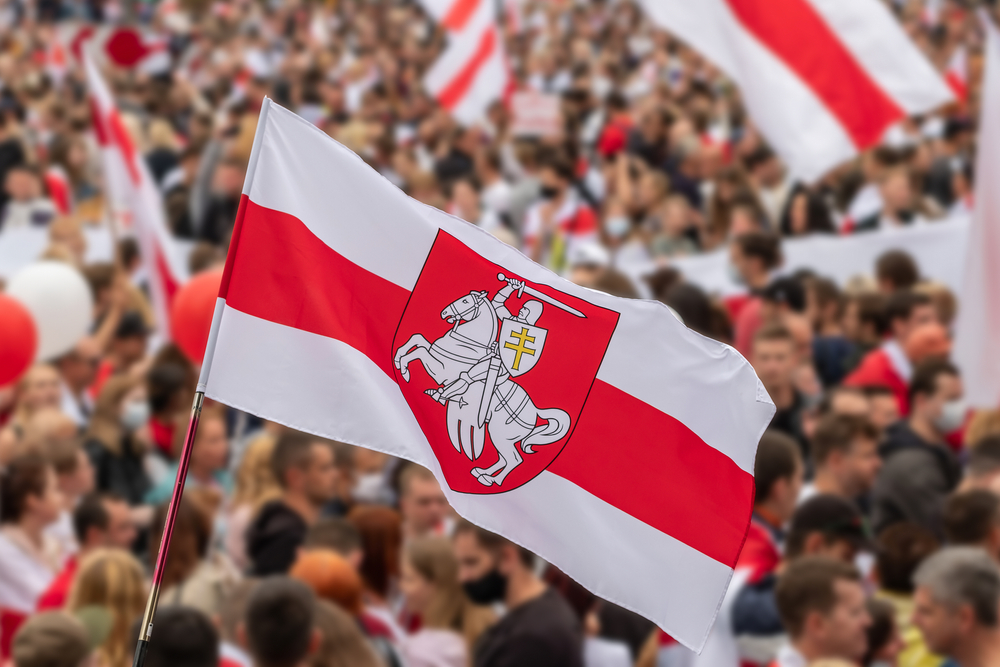
The symbol of today's opposition is the country's flag from the early 1990s.
How different is Belarusian from Russian?
Belarusian is closer to Polish or Czech than to Russian. As part of Russification, grammatical reforms (1933) were made to bring the language closer to Russian. The fraternity of the republics was to be confirmed not only at the borders. Even so, Belarusian retained a special character. But you hardly hear it in the country anymore
Who uses Belarusian today?
Russification has almost pushed Belarusian outside of the public discourse. It happened during the Soviet period and continues to happen; perhaps even more massively. During the Soviet era, there were quotas for Belarusian to be maintained and used in compulsory schooling or in the media, but today you hardly hear it on state television at all. It is used either by opposition politicians, who do not have much support, or by the Belarusian intelligentsia, who use it to express national individuality and distinctiveness. And Belarusian is also associated with the hope for change. But, for example, the entire presidential election campaign and all the speeches of the opposition candidate, Sviatlana Tsikhanouskaya [who was an honoured guest at Charles University last year – ed. note] were in Russian. None of her supporters would ever hold it against her.
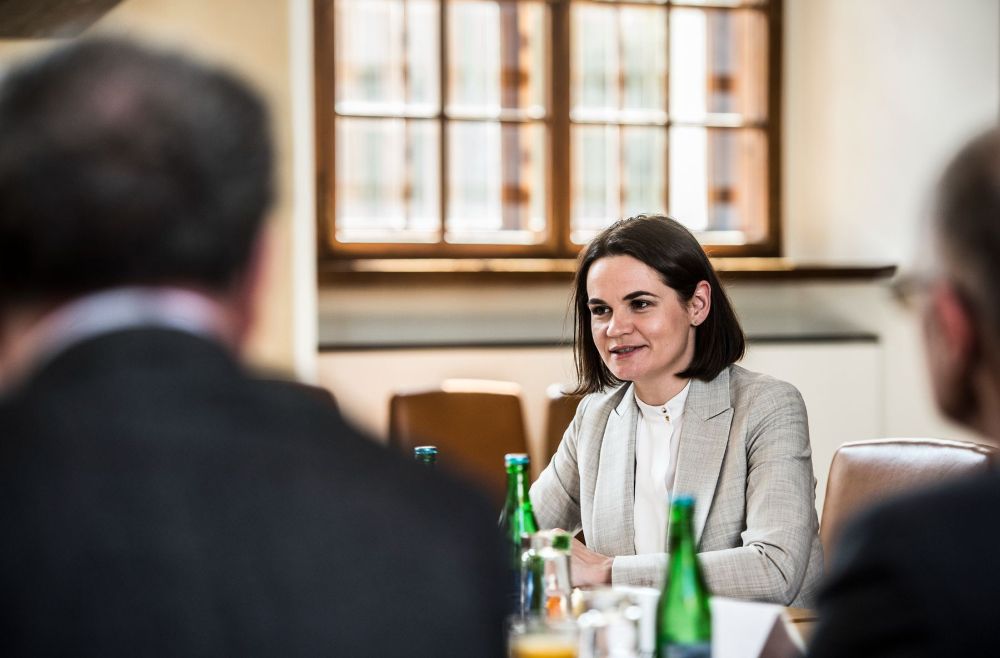
Sviatlana Tsikhanouskaya hosted by Charles University in 2021.
I assume she used Russian because, unlike Belarusian, it is generally more comprehensible to all voters. Is that right?
She didn’t use Belarusian because the language is associated with fascist nationalistic rhetoric in official discourse, such as state television. Opposition politicians used to prefer Belarusian to emphasise national values, to which state propaganda responded by discrediting the national idea by trying to associate the Belarusian language and national symbolism with fascism. It succeeded. State television has a great influence. Since the president has had a monopoly on the public media for twenty-seven years, the Belarusian people have heard more than once under his rule that the national symbolism and idea is 'linked to Nazism and fascism'. Not everyone wants to share the national values that are so discredited. It might discourage people from voting for the opposition.
Belarus has experienced two great waves of national consciousness, in the first half of the 1920s and in the first half of the 1990s. Could the massive upsurge in Belarusian resistance after the presidential elections in August 2020 be another wave in the making?
When the law was passed in 1990 establishing Belarusian as the only state language, the preamble said 'Long live the language, long live the nation'. Does not this idea come back as a theme of the opposition?
It is not coming back, it is not a pressing issue. The vast majority of the population speaks Russian and is fully Russified. The question is whether people who support a change in the state would also support a change in the language. I don't think people would be in favour of switching from the dominant Russian to Belarusian now. It would be difficult to introduce a language that almost nobody speaks nowadays and is quite difficult.
Do you know Belarusian?
I was born in a bilingual family. I learned Belarusian from my grandmother, as Belarusian was commonly spoken in her village when I was growing up. If I had grown up only in the city, I'm afraid I wouldn't have learned the language. In school, it is only taught a few hours a week, the rest of the subjects are all in Russian.
In the 1990s, we thought that Belarusian was the only state language and that it would be the basis of national identity; it didn't work. Today, instead of a national identity, a civic identity is being born, which is not based on a national language, but on belonging and patriotism to the state. It does not matter what language you speak or what costume you wear. After August 2020, a civil society capable of self-organisation and mobilisation through self-help was born. The Belarusian people have changed, and regardless of the repression, the suppression of protests and the start of a new normalisation, it will remain in them.
| After the political and social situation in Belarus escalated following the presidential elections in August 2020, Charles University admitted a dozen local students. It supported them with the Václav Havel Scholarship for people who cannot study in their home country because of the repressive unfree regime. |
Why did this last election lead to such a strong wave of protests?
Most election polls showed a result completely opposite to the one then announced by the Central Election Commission. People really want change now. The current president, Lukashenko, has been in office for twenty-seven years! In that time, the generation that was born and graduated under his rule has already grown up. The standard of living is very low, the country is stagnating... Yet people see what is happening in the Czech Republic or Poland, for example, and know that it is possible to live better lives.
What is happening in Belarus now?
The development is frighteningly similar to what happened in Czechoslovakia after August 1968 - people are facing pressure at work - the "unreliable" are being fired, the most vocal opponents are being forced to emigrate, everyone is being subjected to repression. There is no dialogue with people who are dissatisfied and did not vote for Lukashenko. The regime pretends that everything is fine. The situation is frozen, the question is for how long. As a Belarusian, I find it hard to talk about it. The Prague Spring was associated with the hope for a better life, with liberalisation in all spheres. But these were suppressed by tanks of "friendly troops" in Czechoslovakia, and by local riot police and armed forces in Belarus. The retrenchment is accompanied by propaganda through the state media which seeks to discredit Tsikhanouskaya and her programme as treasonous. The propaganda has targeted, for example, historians - including myself - who publicly describe political and linguistic developments in Belarus and whose position is not in line with the ideas of the Belarusian government.
Can you still travel safely to Belarus?
Until autumn 2020, I travelled to Belarus on a regular basis; I also researched in archives and lectured at the Belarusian State University in Minsk on the topic of national identity and Belarusian history. Even before that, I knew I couldn't talk about everything I wanted to. But now I have not been in Belarus for over a year. Officially, I can go there, but it would not be safe for me. Propaganda attacks me through the pro-government media and tries to dehumanize me in the eyes of Belarusians as a member of the “fascist regime”. Instead of experts speaking and debating ideas, as happens in civilised countries, I am subjected to offensive and unfounded insults. Last year, a new history book called A History of Belarus was published in the Czech Republic, for which I wrote chapters on the 20th and 21st centuries. As a historian, I tried to be objective and describe only the facts of recent developments. However, these are sometimes not in favour of the regime, for example, because of numerous violations of human rights, electoral procedures and so on. I now fear further reactions from officials.
Your parents still live in Belarus. Have they encountered any personal attacks in connection with the fact that you have become a ‘problematic’ individual for the ruling regime?
My parents are retired; they have not faced any threats from their work, that their contract might not be renewed or anything like that. When I was preparing A History of Belarus, I warned them that it might provoke a negative reaction there, which might affect them also. I asked them what they thought if I published it. And my dad told me: “Do what you have to do. We'll take care of ourselves.” So I keep doing what I'm doing. No pressure has been put on them in Belarus yet.
You have a 12-year-old daughter. How does she perceive the current events in Belarus? Are you building a sense of national identity in her, even though she is half Czech and half Belarusian?
I want her to know what is happening in Belarus, but I don't put my opinions into her head. But it affects her too, of course. For the high school magazine she described her experience in Minsk in autumn 2020, the last time we were there. That time she was detained by the police on the street as we were returning from somewhere in the evening. They were checking to see if she was going somewhere to protest. I had to explain to them where we were going and why. It was a stressful and traumatic experience for my daughter.
As a scholar, you became interested in Belarus because it was on the periphery of scholarly interest at the expense of its larger neighbours, Russia and Poland. Did this change after the events of 2020?
Absolutely, now Belarus is in the spotlight. As a researcher, I am pleased about this. When I received a grant from the Grant Agency of the Czech Republic in 2018 to work on issues of national identity and the development of national emancipation during the 1990s in Belarus, no one knew that it would be such a lively topic... Thanks to this, I now have an almost finished monograph that is extremely topical. It will be published in English. The Belarusian question deserves to be heard all around the world.
| Alena Marková, Ph.D. |
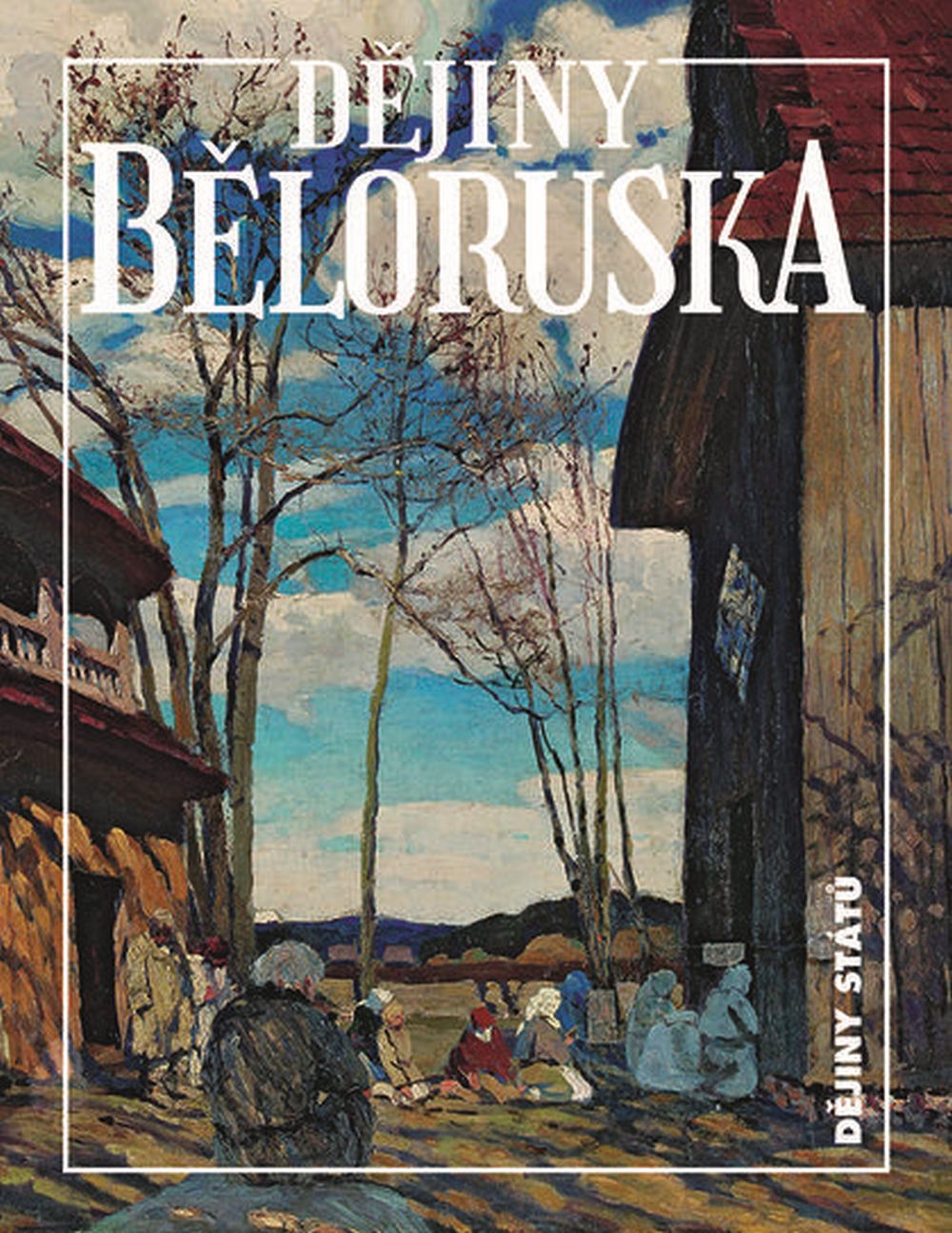 Alena Marková focuses on contemporary history of Central and Eastern Europe, especially the history of the USSR and its successor states, nationalism, national movements and emancipation at the Faculty of Humanities of the Charles University. She is originally from Belarus, where she studied International Economic Relations at Minsk Innovation University; she later graduated from the Faculty of Humanities, Charles University. She is a co-author of the publication A History of Belarus, the associate editor of The Journal of Belarusian Studies (BRILL), and the principal investigator of numerous educational and research projects (4EU+Alliance, GA ČR and others). Alena Marková focuses on contemporary history of Central and Eastern Europe, especially the history of the USSR and its successor states, nationalism, national movements and emancipation at the Faculty of Humanities of the Charles University. She is originally from Belarus, where she studied International Economic Relations at Minsk Innovation University; she later graduated from the Faculty of Humanities, Charles University. She is a co-author of the publication A History of Belarus, the associate editor of The Journal of Belarusian Studies (BRILL), and the principal investigator of numerous educational and research projects (4EU+Alliance, GA ČR and others). |



